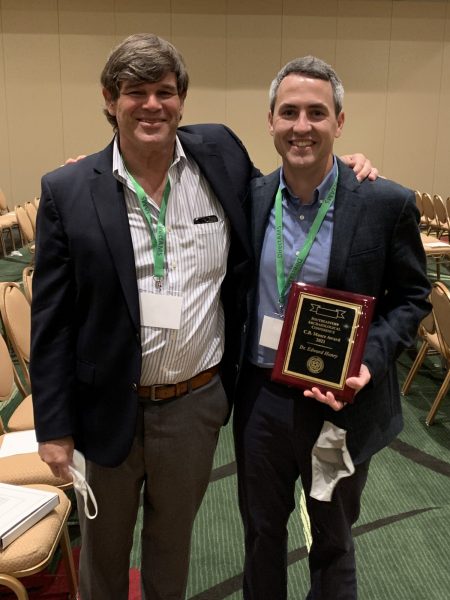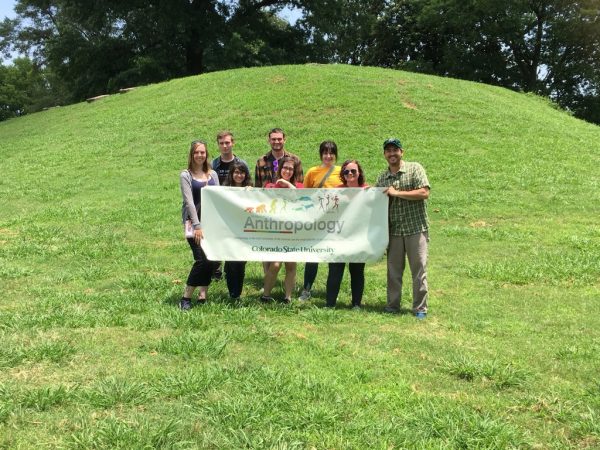Henry Wins Top Southeastern Archaeology Award
Joshua Zaffos
Colorado State University Assistant Professor of Archaeology Edward Henry has won the 2021 C.B. Moore Award from the Southeastern Archeological Conference. Henry received the award at the professional organization’s annual meeting in Durham, North Carolina this October.
The C.B. Moore Award annually recognizes a preeminent young scholar in the field of Southeastern United States archaeology. Recipients are determined by a committee of past award winners and other conference executive-committee members, including global leaders in the field of archaeology who have worked in the region.

“Being granted this award is just so humbling,” said Henry, originally from Kentucky. “It is the most direct peer-review of its kind; a nod from your peers and senior colleagues for the work you have done.”
As a graduate and doctoral student, and since becoming a professor at CSU in 2018, Henry has conducted research across the Southeastern U.S. examining pre-contact Native American landscape modification and what those changes in the built and natural environment tell us about ancient people’s social, political, spiritual, and economic lives and connections. Henry specializes in geoarchaeology — using methods of soil science, aerial and terrestrial remote sensing tools, and techniques such as Bayesian chronological modeling — to recognize and analyze human and natural changes to land that occurred centuries and even millennia ago. For his doctoral dissertation at Washington University, Henry studied and wrote on “geometric earthen enclosures” — purposely built mounds made of soil, wooden posts, and other natural materials — and their uses by people in the Middle Ohio River Valley 1,600-1,100 years ago as societies were transitioning from hunters and gatherers to agriculturalists living in increasingly permanent settlements.
Southeastern archaeology often centers around sites of mound-building cultures that lived and thrived in the region as far back as 5,000 years ago through the 1500s A.D. Through his early career, Henry has also conducted research on hunter-gatherers in the Lower Mississippi Valley during the Late Archaic period (circa 3000-1000 B.C.); cultural ceremonies and social interactions in the Ohio and Mississippi River Valleys during the Middle Woodland era (200 B.C.- 500 A.D.); and early forms of urbanism at the well-known and largest Mississippian cultural site of Cahokia outside present-day St. Louis, Mo. His current research includes an ongoing project at present-day Pinson Mounds State Archaeological Park in western Tennessee, which he used for the main excavation site of the 2019 CSU Archaeology Field School.
“This is a major professional accomplishment and recognizes Ed’s significant contributions to archaeological method and theory, as well as his distinctive contributions to Southeastern archaeology,” said Tristram “T.R.” Kidder, Department of Anthropology Chair and Professor at Washington University and Henry’s doctoral advisor. “This award recognizes scholars for their academic accomplishments, but criteria also include professional service and contributions to the field and to the Conference. In receiving this award Ed joins a list of immensely impressive scholars that are leaders in the field.”
“Dr. Henry’s nominator [Kidder] called him a quintessential collaborative scholar, and this is easily demonstrated by his research and publication record,” said Janet Levy, Professor Emerita at the University of North Carolina, Charlotte, Department of Anthropology, who presented Henry with the Moore Award.
Henry also presented at the conference on his ongoing research surrounding studies of pre-contact earthen enclosures and their roles as ceremonial gathering places during the Middle Woodland-era in Central Kentucky, roughly 1,600 to 1,900 years ago.

“The Southeastern U.S. is an amazing region to investigate the deep temporal and social ties Indigenous societies had with the world they lived in,” Henry said. “We can ‘historicize’ the archaeological past by tracing the diverse and intensive engagements with specific places and landscapes, sometimes over millennia.
“For me, this work helps offer specific historical meanings and consequence to groups that have been forcibly removed from those lands. Archaeology in the Southeast has shown that the histories of ancestral Indigenous societies were complex and dynamic in ways that resist past and present stereotypes of Indigenous Americans and their ancestors.”
At CSU, Henry founded and directs the Center for Research in Archaeogeophysics and Geoarchaeology (CRAG). He teaches courses including Introduction to Archaeology (ANTH 140), Geoarchaeology (ANTH 353/552), Archaeologies of Graffitti (ANTH 358), and Digital Digging: Geophysics in Archaeology (ANTH 420). In addition to leading the 2019 Archaeology Field School at Pinson Mounds, he also directed the 2020 program, based on the CSU campus due to COVID-19.
“Dr. Henry’s research is innovative and powerful in what it reveals about past Indigenous societies living in the southeastern quadrant of the US,” said Mica Glantz, Chair and Professor of the CSU Department of Anthropology and Geography. “His work fits well within the large, impactful canon of archaeological research that the C.B. Moore Award honors. We are proud to count him as a member of our faculty.”